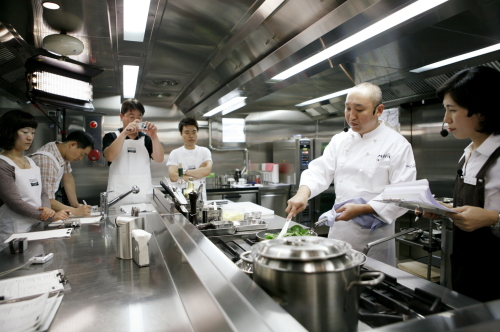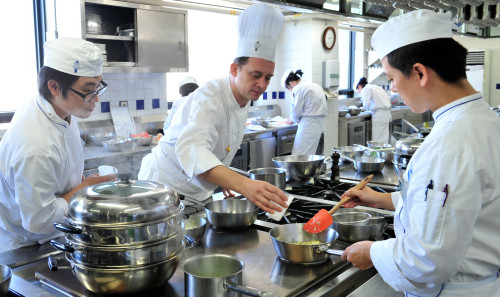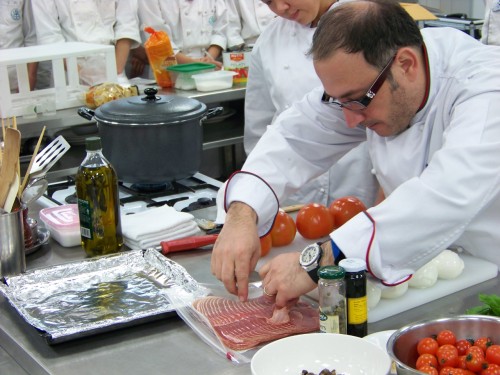TV dramas and celebrity chef shows spur owner-chef hopefuls
On a Saturday afternoon, Kim Nak-young brushes up on his cooking skills, hovering near professor Maurizio Ceccato, watching him deftly handle chub mackerel.
Having just completed the three months of training needed to attend the prominent Italian Culinary Institute for Foreigners in Italy, the 33-year-old is one step closer to his dream.
“I want to be an owner-chef,” he revealed, before dispelling any notions that his dreams of chefdom might have been spurred by the onset of a fledgling mid-life crisis.

On the contrary, Kim had always wanted to cook, but he opted for a different career path. That is, until he came across a series of articles about people finding new professions later in life.
Inspired, Kim quit his job and enrolled at the Korea Preschool of the Italian Culinary Institute for Foreigners, where he would undergo culinary and language training here before polishing his schooling off at the institute’s headquarters in Piemonte, Italy.
Now, ready to jet off to Italy, Kim discussed why he opted for a program with a local base.
“At first I looked at overseas cooking schools, but it was not as easy as I thought it would be, and I heard it was hard,” he said.
Apparently Kim is not the only aspiring owner-chef to balk at the thought of leaving home turf.
Fellow Korea Preschool master program student Jang Won-young said he “did think of going overseas to The Culinary Institute of America or to Le Cordon Bleu,” but the lengthy period he would have to spend abroad deterred him.
Le Cordon Bleu-Sookmyung Academy student Lee Ji-hye said she enrolled at the Korean campus of the famed institute because “I want to combine what I learn with hansik so I didn’t consider going overseas. Plus, there are French chefs teaching here, so I don’t feel the need to go abroad.”

Fellow Le Cordon Bleu-Sookmyung classmate Kwon Sun-min cited language barriers and cost as the primary reasons behind why he chose the program.
Increasingly, students like Kwon are taking advantage of the growing number of local schools affiliated with or even partially run by famous overseas academies in Korea, and it is quite possible that such demand is leading to the proliferation of these types of institutes.
After Le Cordon Bleu’s Korean campus opened in 2002, the Korea Preschool of the Italian Culinary Institute for Foreigners opened in 2005. That same year the Korea-based Il Cuoco Italian Culinary Institute launched a similar three-month pre-training program for students looking to attend the Italy-based international educational and training center for Italian cuisine, ALMA.
Just three years later, the talent and know-how of the famed TSUJI Group -- parent to its namesake Osaka institutes -- were enlisted by PDP Wine Co., LTD. for the creation of tsuji+1, a private academy where students can learn to cook from TSUJI Group professors based on a curriculum custom-designed for Korea.
So why are all these places popping up?
Tsuji+1 PR team manager Liz Park attributes the trend to the government’s Korean Cuisine to the World project, a booming food and beverage industry and to star chef-fronted reality shows.

“I think and feel from watching our students that Korea’s food industry is developing very swiftly,” said Park, adding that the government’s promotion of hansik on a global scale has fostered interest in cuisine, and therefore cooking.
“I feel that perceptions towards food are shifting,” she continued. “Celebrity chefs did not exist in Korea in the past, but thanks to cable television’s ‘Hell’s Kitchen’ and to Jamie Oliver; that has changed.”
If Gordon Ramsay shaped the definition of chef stardom through the small screen, now Koreans can look up to their own set of celebrity chefs, chefs whose high profiles have catapulted the cooking profession into the spotlight, inspiring the masses.
“Before, students just came to learn how to cook French food at home,” said Le Cordon Bleu-Sookmyung Academy chef de cuisine Laurent Beltoise. “Now almost all of the students want to be professional.
"According to Beltoise, the number of chef-driven students started to increase two years ago.

What sparked this influx?
Beltoise points to Korean television dramas.
“When there is a pastry drama, there are more pastry students,” he said, explaining how each drama results in a notable increase of students in whatever category of cuisine the series dabbles in.
“After ‘My Lovely Sam-Soon’ aired, pastries were popular,” Le Cordon Bleu-Sookmyung Academy PR manager Yang Jin-won agreed, detailing how television dramas give audiences a glimpse into the life of a chef.
“There has been an increase in people who want to cook as a hobby or become a chef,” Yang said. “Now chefs are seen as a good career choice, as an artistic profession.”
Tsuji+1, which also targets housewives, has also had food industry insiders, restaurant owners and owner-chef hopefuls enroll in classes.
“We have a pastry class and the students who are in their late 20s and 30s tend to come because they want to open up their own cafes,” said Park.
With an increasing number of students who want to run their own eateries racking up experience at high profile academies like Tsuji+1, what does the future hold?
Judging from the popularity of the most recently-opened Tsuji+1 -- whose classes are full -- it looks like a continued expansion of the culinary education market, through both domestically-created and more overseas-related programs is where we are heading.
Tsuji+1’s Park revealed future plans to use the know-how they learn from TSUJI to create a hansik culinary program, while Le Cordon Bleu-Sookmyung’s Yang voiced a desire to see their academy’s alumni set up their own schools.
Meanwhile, there is also a future chance that students may be able to take certain programs from The Culinary Institute of America on home turf.
Both the head of Synergience -- whose company has been in contact with the institute -- and the associate vice president of The Culinary Institute of America revealed that they are looking into opportunities to pursue a project that would bring specific food enthusiast and continuing education professional culinary programs into Korea.
“A market for learning how to cook in a professional way will develop no matter what,” Synergience CEO Park Won-young predicted. “And I think that market will expand.”
Tsuji+1
Chinese, Japanese, Italian, French and pastry-dessert programs are held in rotation. Located in Sinsa-dong. For more information, call (02) 516-4678 or visit www.tsujione.com.
Le Cordon Bleu-Sookmyung Academy
Two- to four-level cuisine, pastry and bread programs available, located on Sookmyung Women’s University campus. For more information call (02) 719-6961 or visit www.cordonbleu.co.kr.
Italian Culinary Institute for Foreigners Korea
Italian master, professional, theme and hobby courses available. Located in Jamwon-dong. For more information, call (02) 3445-5890 or visit www.icif.co.kr.
By Jean Oh (oh_jean@heraldcorp.com)










![[Feature] Ignorance about Africa still rampant in Korea](http://res.heraldm.com/phpwas/restmb_idxmake.php?idx=644&simg=/content/image/2024/05/28/20240528050572_0.jpg&u=20240528164942)







![[Today’s K-pop] Seventeen to greet fans in Seoul in July](http://res.heraldm.com/phpwas/restmb_idxmake.php?idx=642&simg=/content/image/2024/05/28/20240528050640_0.jpg&u=)